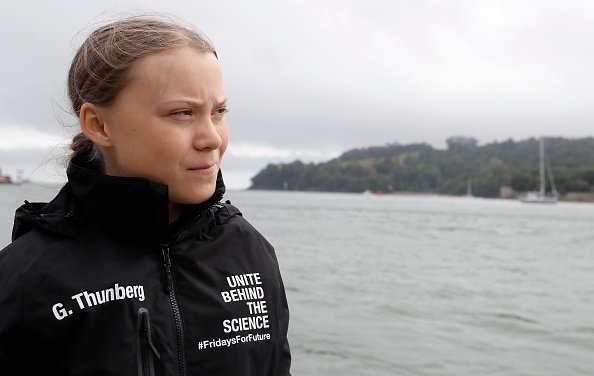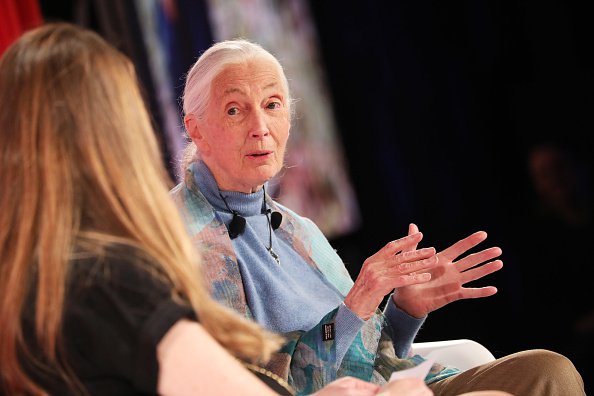
Where We Gonna Run To?
Lamentations of a 'Climate Canary’
“O sinnerman, where you gonna run to / all on that day?”
By Cynthia B. Astle
© United Methodist Insight 2019
I have become a prisoner of climate change. I spent this past summer, amid the hottest July on record, trapped inside my air-conditioned Texas home because I became ill whenever I ventured outside into triple-digit heat indices. Like a canary once used as an early detector of deadly gases in a coal mine, I have joined the likely millions of people whose age or infirmities make us especially vulnerable to the changes wrought in Earth’s environment because of human activity.
We “canaries” are old, with bodies wracked by chronic illness or ravaged by aging. We’re also very young, with little biosystems that haven’t lived long enough to acquire some resistance to poisons in our air, water and earth. We “canaries” picked vegetables and fruits on factory farms blanketed in pesticide fogs that are killing the bees that pollinate our produce. We “canaries” worked in toxic environments like oil tankers, wreathed daily in petrochemical fumes that eventually gave us cancer like they did two of my Merchant-Marine uncles.
We “climate canaries” are the early warning system for the stronger, healthier members of our human species. In the industrialized world, we eat and drink “food products” that have been processed with artificial chemical compounds and packaged in indestructible plastics. We get around in automobiles that spew choking carbon dioxide into the precious envelope of atmosphere, trapping the Sun’s heat and scorching the only planet we have on which to live.
“I run to the sea / it was boiling. I run to the sea / it was boiling. / All on that day.”*
Those who deny the reality of climate change are to be pitied, but they must not be allowed to dictate the world’s future. This year many news journals have chronicled our failures to rein in our destructive activities and their results. Within the past year I’ve read three heart-stopping reports that outline the danger we face:
- Losing Earth: The Decade We Almost Stopped Climate Change by Nathaniel Rich, with photographs and videos by George Steinmetz of the New York Times Magazine;
- Dangerous New Hot Zones Are Spreading Around the World by Chris Mooney and John Muyskens with photos and videos by Carolyn Van Houten for the Washington Post’s series “2C: Beyond the Limit”; and
- Extreme Climate Change Has Arrived in America by Steven Mufson, Chris Mooney, Juliet Eilperin and John Muyskens with photography by Salwan Georges, also for the Washington Post’s series.
There are dozens more reports I could cite. The past two weeks alone were full of news about the Trump Administration rolling back beneficial regulations on light bulbs; repealing rules that kept our water clean; and interfering with hurricane predictions from the National Oceanographic and Atmospheric Administration (NOAA). These occurred despite new polls showing that eight in 10 Americans accept climate change as caused by human activity and four in 10 thinking we are in a worldwide crisis. A quote from the New York Times article on light bulbs by John Schwartz:
“The actions are the latest by the Trump administration to weaken a broad array of rules designed to fight climate change. Last week it announced a far-reaching plan to cut back on the regulation of emissions of methane, a powerful greenhouse gas. Earlier this year it proposed freezing antipollution and fuel-efficiency standards for cars, and tried to replace the Clean Power Plan, a signature emissions-reduction measure of the Obama administration.
“President Trump has repeatedly dismissed the scientific consensus that climate change is caused by human activity and requires urgent action to avoid its most dire effects, even as government scientists have warned about the damage that global warming is already causing the United States’ economy.”
“I run to the Lord / Please hide me, Lord /
Don’t you see me prayin’? / All on that day.”*
Trouble is, while the effects of anti-environmental policy are undeniable, the big picture is that we humans are just as culpable for the good things we do as we are for the bad. Who could say that building decent homes to shelter people from the elements is a bad thing? Who could say that learning how to grow more and better food to feed starving millions is bad? How could creating vaccines to inoculate us against infectious diseases and preserve lives be bad? And yet…
David Barr, a teaching fellow at the University of Chicago Divinity School, points out in a recent issue of Sightings newsletter the ethical conundrum in which we find ourselves:
“If our environmental problems are of a piece with human problems, then addressing those human problems should help the environment. However, while human problems like poverty cause environmental problems, so do successes like economic development. War disrupts nature, but so does peace. Moral evils can exacerbate natural evils, but moral goods can as well. Our successes in reducing predation, food scarcity, disease, and violence represent undeniable human goods, but they have turned a species that was once just one land ape among others living in southeast Africa into the most dominant and disruptive species on earth. Too strong an emphasis on the intersection of different types of evil may lead us to miss the reality that human goods can drive environmental disruption, perhaps as much or more than human evils.”
“But the Lord said, ‘Go to the Devil’ / The Lord said, ‘Go to the Devil’ /
All on that day.”*
This firestorm of anguished climate news gave me an initial reaction that psychologists are calling “climate despair.” In an article for the online journal Vice, ‘Climate Despair Is Making People Give Up on Life, writer Mike Pearl quotes David Wallace-Wells from his 2019 bestseller The Uninhabitable Earth:
"For most who perceive an already unfolding climate crisis and intuit a more complete metamorphosis of the world to come, the vision is a bleak one, often pieced together from perennial eschatological imagery inherited from existing apocalyptic texts like the Book of Revelation, the inescapable sourcebook for Western anxiety about the end of the world.”
As a Christian I recoil from this assertion. Yes, Revelation is an apocalyptic text, but “apocalypse” is a term that has been corrupted into meaning a catastrophic end to history without the hope and justice that form such biblical literature’s ultimate intentions. Virtually every world religion has its “end times” myths, but most also hold out hope that justice can come from resurrection after calamity.
 However, resurrection requires that we relinquish those activities that cause destruction. What’s required of us is a tectonic shift in attitude about our place in the biosphere of the Earth. We are caretakers, not controllers, of God’s creation; we are part of the animal kingdom and of the planet’s ecology, as primatologist Jane Goodall (pictured)has asserted. A million species are poised on the edge of extinction; some, like Australia’s koalas, already are functionally extinct because there aren’t enough of them left to sustain future generations.
However, resurrection requires that we relinquish those activities that cause destruction. What’s required of us is a tectonic shift in attitude about our place in the biosphere of the Earth. We are caretakers, not controllers, of God’s creation; we are part of the animal kingdom and of the planet’s ecology, as primatologist Jane Goodall (pictured)has asserted. A million species are poised on the edge of extinction; some, like Australia’s koalas, already are functionally extinct because there aren’t enough of them left to sustain future generations.
Against this backdrop, Sept. 20 will begin a significant period in global creation care. On that day, students and their adult supporters around the world will engage in a Global Climate Strike effort that continues through Sept. 27. Worldwide demonstrations will demand that governments and businesses take immediate action to cease activities that contribute to climate change and work to restore what has been lost. (There will be a Global Climate Strike demonstration in my hometown of Dallas, Texas, but I can’t participate; it still will be too hot outside for me to venture forth without harming myself.)
The next day, a U.N. Climate Action Summit begins at the United Nations headquarters in New York City and continues through Sept. 23. Young Swedish environmental activist Greta Thunberg will attend after sailing across the Atlantic Ocean rather than flying to reduce the carbon emissions caused by her travel. U.N. Secretary-General António Guterres “has called on nations to step up their plans for cutting greenhouse gas emissions,” write Kelly Sims Gallagher and Fang Zhang of Tufts University in an article for The Conversation, “China is Positioned to Lead on Climate Change as the US Rolls Back Its Policies.”
The U.N. Climate Action Summit website includes an open-access tracker tool fashioned by researchers in the United States, the United Kingdom and Australia. According to the website, “This open-access tracker tool pulls together the myriad of different climate pledges that have been made by nations, cities, businesses and others. Also included in the tracker tool are examples of progress across key sectors, current information on climate impacts, climate-related initiatives and key dates in the climate calendar.”
The tracker offers one way that we “climate canaries” can participate in the grassroots efforts on climate change, even if its effects keep us from engaging in mass demonstrations like the Global Climate Strike. As a United Methodist Christian, I offer these additional suggestions:
- Grieve. Yes, we mustn’t give in to “climate despair,” but neither should we gloss over what we’ve lost. Personalize your lamentations as much as possible, because they will keep you in touch with what you’re fighting for. For myself, I grieve the loss of the wild Florida I knew as a child, when my playmates and I roamed freely around our neighborhoods delighting in the subtropical nature around us.
- Pray. We won’t be able to face our fears and maintain spiritual strength against “climate despair” without being connected to the Source of all. Don’t ask God for quick solutions; listen for what God has to say.
- Learn. Study not only what practical things you can do to change your habits and those of your congregation, but also steep yourself in what The United Methodist Church says about caring for God’s creation. See these examples.
- Act. Plant a tree or donate to have trees planted on your behalf. Call your federal representatives and demand they restore beneficial environmental policies. Register to vote, and then vote. Elect people to office at all levels who will stand up to climate ravaging practices. Keep looking for things to do within your power.
- Sacrifice. There’s no way around the global climate crisis except to go through it, and that means sacrificial lifestyle changes. Expect to adapt to “new normal” practically every day, but don’t become resigned to a seemingly inevitable catastrophe.
If we do nothing about climate change, Earth will survive in a new form, but we humans won’t. We “climate canaries” will be the first to die off. Instead of building a rocket ship to Mars to avoid extinction, I will plant trees. I’ll never see them mature, but those who come after me will, hopefully in a clean, green, wonderful world.
“O sinnerman, where you gonna run to / All on that day?”*
Cynthia B. Astle serves as Editor of United Methodist Insight, which she founded in 2011. *Quotes from “Sinnerman” by Nina Simone cited under U.S. copyright fair use.
Send comments about this article to United Methodist Insight.
